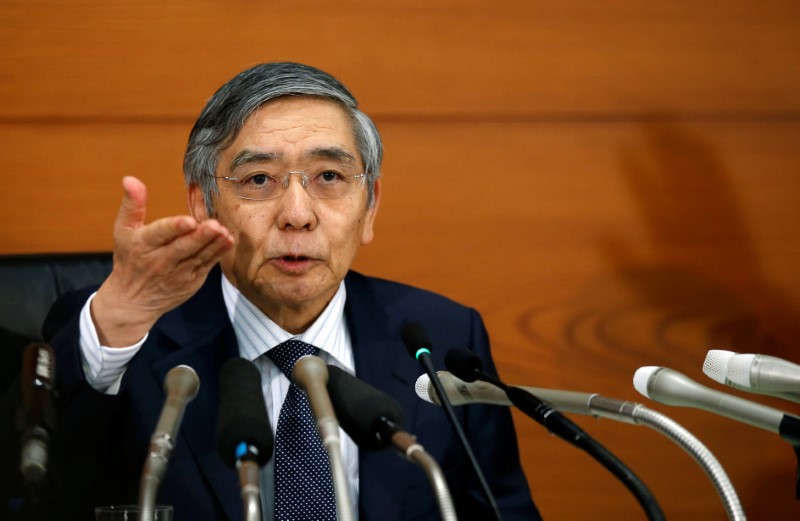By Leika Kihara
OSAKA (Reuters) - The pace at which the Bank of Japan buys bonds will depend on what is needed to achieve its yield curve target but no big increases or decreases were expected for now, Governor Haruhiko Kuroda said on Monday, dampening speculation that the BOJ was considering tapering asset purchases.
Kuroda, in his first speech since the BOJ's decision last week to reform its radical stimulus program, said the central bank stood ready to use every available tool to achieve its 2 percent inflation target.
On Wednesday, the BOJ dropped its previous target of increasing base money at an annual pace of 80 trillion yen ($792 billion), a move analysts saw as an acknowledgement that its huge bond buying program was reaching its limits.
The BOJ may instead top up asset purchases or accelerate base money expansion to push down borrowing costs sharply, if economic and price conditions warranted such "powerful" monetary easing, Kuroda said in a speech to business leaders in Osaka, western Japan.
Such changes in the amount of bond purchases would have no policy implications, he noted.
While the BOJ would be mindful of the impact ultra-easy policy could have on banks' profits, that would not prevent it from expanding stimulus if needed to revive Japan's economy.
"There is no better opportunity than now to completely get out of deflation. Talking about the limits of monetary policy does not help at all," Kuroda said.
The BOJ made an abrupt shift last week to targeting interest rates on government bonds to achieve its elusive inflation target, after years of massive money printing failed to jolt the economy out of decades-long stagnation.
Under a new "yield curve control" (YCC) framework, the BOJ's main means for monetary easing would be to deepen negative interest rates from the current minus 0.1 percent, or lower its 10-year government bond yield target - now set at around zero percent, Kuroda said.
While the BOJ's move to target a specific government bond yield surprised market watchers, some economists said something much more ambitious is needed to break Japan out of deflation.
The 10-year bond yield has briefly slipped below zero percent since Wednesday's decision, leaving markets wondering whether the BOJ would reduce its bond buying to prevent the yield from falling further away from its target.
Kuroda said daily moves in 10-year yields would not have much effect on the BOJ's policy, stressing the importance of guiding the entire yield curve to a desirable shape.
"Unlike short-term rates, central banks cannot completely control long-term rate moves," Kuroda said. "I don't think recent moves in long-term yields have raised doubts about the BOJ's ability to control the yield curve."
Several corporate executives present at the meeting complained about the yen's recent ascent to a one-month high, saying that it could hurt their export-reliant businesses.
Kuroda said he would watch closely how recent yen gains could affect Japan's economy, and warned of lingering overseas uncertainties that could cloud prospects of Japan's recovery.
"It's basically desirable for currency rates to move stably reflecting economic fundamentals," Kuroda said, stressing that it was a shared understanding among Group of 20 nations that excess volatility and disorderly currency moves hurt growth.
